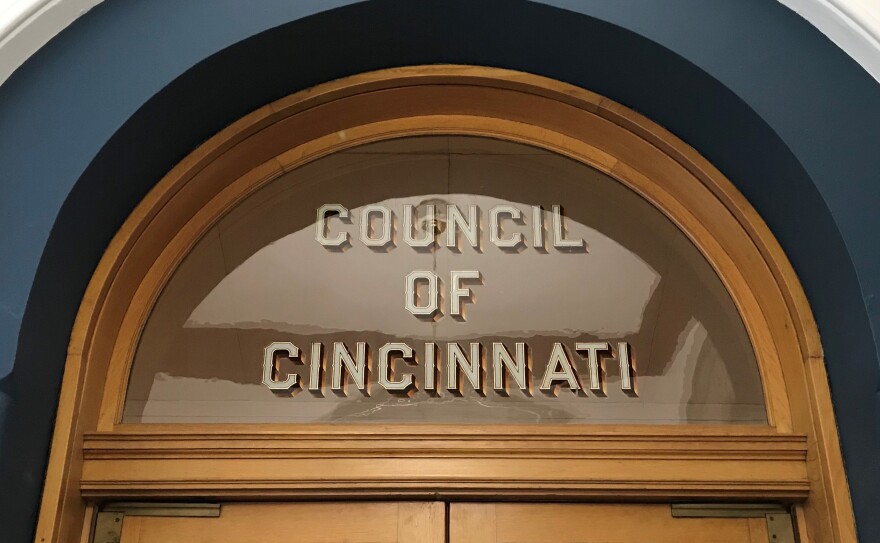Issues 1 and 2 on the May ballot in Cincinnati aim to address city council members who are indicted on federal charges related to their jobs on council.
Vice Mayor Christopher Smitherman introduced Issue 1, and Council Member Betsy Sundermann introduced Issue 2. Both members support both amendments.
WVXU spoke with Smitherman and Sundermann to learn more about the amendments and why they want Cincinnatians to support them. On Monday, April 19 at noon, Cincinnati Edition host Michael Monks will ask Smitherman and Sundermann additional questions about their amendments.
What Inspired The Amendments?
Both charter amendments are in response to three council members indicted on corruption charges last year - more specifically, in response to the arrests of Jeff Pastor and P.G. Sittenfeld.
Pastor is charged with honest services wire fraud, bribery, attempted extortion by a government official and money laundering. Sittenfeld is charged with honest services wire fraud, bribery and attempted extortion by a government official. Both are accused of accepting money in exchange for favorable votes on development projects.
Currently, there are two ways for a council member to be suspended:
First, through the state attorney general. Pastor and Sittenfeld agreed to a voluntary suspension from the attorney general, but if they had not agreed the process for suspension could have taken weeks or months.
Second, through the Hamilton County Probate Court, if four citizens file a complaint. Similarly, the court process would be lengthy.
What Issues 1 And 2 Share: Successor Designees
Each amendment includes a provision that prevents a council member from changing their successor designee after they've been indicted on charges related to their job on council.
As it stands now, each council member decides which member or members will choose their replacement if they vacate the office, by resigning to take another job, for example. Typically members can change these successor designees at any time.
Both charter amendments specify a council member can't change their successor designee after being indicted.
Issue 1 Adds A Special Prosecutor
Smitherman's amendment deals with one of the two existing ways to suspend a council member. If citizens file a complaint with the probate court, the city solicitor is tasked with prosecuting the case.
Because the city solicitor's boss is City Council, Smitherman says this presents a clear conflict of interest.
"They could have represented us in a case that they're now asked to take action for removal," Smitherman said. "It just naturally creates this conflict of interest between the legal department and their clients."
Issue 1 would require the city solicitor to instead appoint a special prosecutor to litigate the case against any indicted council member.
Issue 2 Offers A Third Option For Suspension
Sundermann says the city needs a third option to suspend a council member accused of wrongdoing.
"If the current council members [Pastor and Sittenfeld] had not voluntarily agreed to a suspension, we probably would have been in a position where one or both of them would keep showing up every week, proposing legislation and voting on legislation. And that's not good," Sundermann said.
Issue 2 gives council the authority to suspend a member internally.
If a council member is charged with a state or federal felony related to their duties, it triggers a council hearing. This only happens if the charges are job related; that means a council member could be charged with robbing a bank and not necessarily trigger this process.
The accused member would get a chance to plead their case. A suspension would require seven positive votes, a supermajority of the nine-member council (the accused member would not be eligible to vote).
If a member is suspended through this process, a temporary replacement would be chosen by that council member's successor designee.
The suspension would automatically end if the charges were dismissed or the member was acquitted, as long as their term has not ended.
If the member is convicted of a felony related to their job on council, the suspension automatically becomes a full removal.
Issue 2 Requires Ethics Training
Sundermann's amendment has a third provision to require ethics training for all council members within 60 days of taking office.
Currently, ethics training is voluntary and only offered at the start of every regular term. Sundermann points out four current members of council took office in the middle of a term - Steve Goodin (who replaced Pastor), Liz Keating (replacing Sittenfeld), Jan-Michele Lemon Kearney (replacing former councilwoman Tamaya Dennard, who resigned following her own bribery scandal) and Sundermann herself (replacing Amy Murray, who left to take a job with the Trump administration).
The training would be done through the Ohio Ethics Commission. If a council member doesn't prove the training is complete within 60 days, they would be unable to attend or participate in council meetings, or vote on or introduce legislation.
What Happens If Both Issues Pass?
Although they somewhat overlap, the two charter amendments don't conflict; if both receive a majority positive vote, both would be implemented into the city charter.
Because they each include a provision about successor designees, with distinct language in each amendment, the measure that receives the most votes will provide the language amending that portion of the charter.
See the full Issue 1 charter amendment below (Issue 2 follows):
Issue 1 — Cincinnati May 20... by WVXU News
See the full Issue 2 charter amendment below:
Issue 2 — Cincinnati May 20... by WVXU News
See a full sample ballot below:
Hamilton Co. May 2021 Elect... by WVXU News
The "Trust In Local Government: WVXU's Public Integrity Project" examines Cincinnati politics and the individuals who shaped it. Read more here. Support for this project comes from The Murray and Agnes Seasongood Good Government Foundation.





